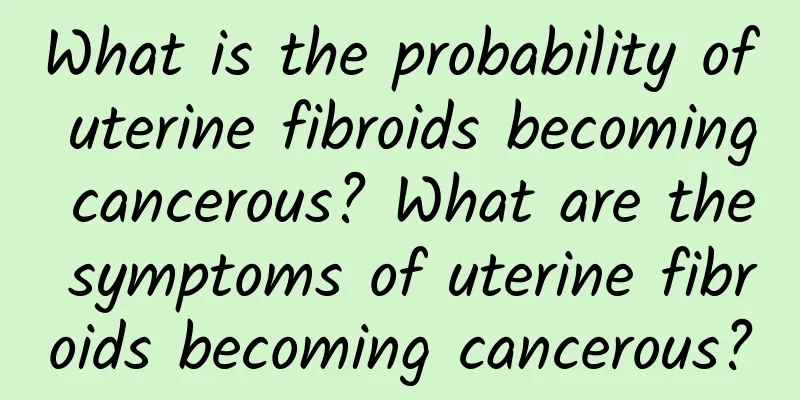What is the probability of uterine fibroids becoming cancerous? What are the symptoms of uterine fibroids becoming cancerous?

|
What is the probability of uterine fibroids becoming cancerous? What are the symptoms of uterine fibroids becoming cancerous? In recent years, uterine fibroids have become one of the most common reproductive organ diseases in women. However, many people know little about the chances of uterine fibroids becoming cancerous and the related symptoms. This article will explore these two issues in depth to help readers better understand the characteristics of uterine fibroids and related health problems. We need to clarify what is the cancer rate of uterine fibroids. Uterine fibroids are a common benign muscle tumor that usually grows on the wall of the uterus. Most uterine fibroids are benign, and only a few will develop into malignant tumors, that is, cancer of uterine fibroids. According to research, the cancer rate of uterine fibroids is approximately between 0.1% and 0.5%. This means that only a very small number of patients will experience cancer of uterine fibroids, and most patients can rest assured. However, despite the low chance of cancer, the symptoms of uterine fibroids cannot be ignored. Although most uterine fibroids have no symptoms, some cases have the following symptoms: 1. Severe abdominal pain: When uterine fibroids grow larger, they may compress nearby tissues and organs, causing severe abdominal pain. This pain often worsens with the menstrual cycle, but usually subsides after the menstrual period. 2. Irregular menstruation: Uterine fibroids may interfere with the normal menstrual cycle and make it irregular. Some women may experience increased menstrual flow, shortened or prolonged menstrual cycles, etc. 3. Frequent urination and urgency: The growth of uterine fibroids may put pressure on the bladder, causing frequent urination and urgency. This is because the tumor increases the sensitivity of the bladder, making women feel the need to urinate frequently. Although the above symptoms may be related to other gynecological problems, if they occur together with uterine fibroids, then it is necessary to conduct relevant tests and diagnosis. Doctors usually perform physical examinations, ultrasounds, MRIs or CT scans to confirm the diagnosis. So, how can you reduce the chances of uterine fibroids becoming cancerous and better manage their associated symptoms? Here are some suggestions: 1. Regular check-ups: Regular gynecological examinations are the key to preventing and early detection of uterine fibroids. Regular check-ups can help doctors detect changes in fibroids early and treat them. 2. Healthy lifestyle: Maintaining a healthy lifestyle can help prevent and manage uterine fibroids. This includes eating a balanced diet, reducing alcohol and caffeine intake, and getting moderate exercise. 3. Non-surgical treatment: For most benign uterine fibroids, non-surgical treatments are usually sufficient. Drug therapy and partial interventional therapy are some common non-surgical treatments. However, in some cases, surgery may be a necessary option. Although uterine fibroids have a low chance of becoming cancerous, the symptoms of the disease may have an adverse effect on the patient's health and quality of life. Therefore, it is important to understand the symptoms and management of uterine fibroids. Through regular checkups, a healthy lifestyle, and appropriate treatment, we can effectively prevent and manage problems related to uterine fibroids to maintain good health and quality of life. |
Recommend
When is the best time to have a painless abortion?
There is no "best time" for painless ab...
What are the hazards of second-degree cervical erosion? Second-degree cervical erosion has four major hazards to women
I believe many female friends know that cervical ...
What should be checked before uterine fibroid surgery? Are uterine fibroids multiple?
Uterine fibroids are the most common benign tumor...
How to quickly solve dysmenorrhea? These few tips for treating dysmenorrhea (2)
What to eat for dysmenorrhea? 1. Red dates We all...
What is the cause of multiple uterine fibroids? Are multiple uterine fibroids benign tumors?
The cause of multiple uterine fibroids is a probl...
What items should be checked for scanty menstruation
Low menstrual volume may be caused by many factor...
15 minutes of non-stop aerobic exercise to boost metabolic rate
Many people feel that they can never gain weight ...
What preparations should be done before abortion surgery
If a woman finds herself pregnant but does not wa...
What are the types of uterine fibroids?
Uterine fibroids are also called uterine smooth m...
What are the symptoms of pelvic fluid during ovulation?
Many friends who are working have little time to ...
Eating fish heads can prevent aging and improve skin health! The heat mine is hidden here...
During the Spring Festival, families reunite and ...
What are the causes of vaginitis?
Everyone knows that female vaginitis is a common ...
Can ovarian cysts affect their life expectancy?
Will ovarian cysts affect life expectancy? Accord...
How does Western medicine treat irregular menstruation?
In today's society, many women suffer from ir...
How big is a uterine fibroid to be considered serious? If these conditions occur, timely treatment is required
How serious are uterine fibroids? Uterine fibroid...









